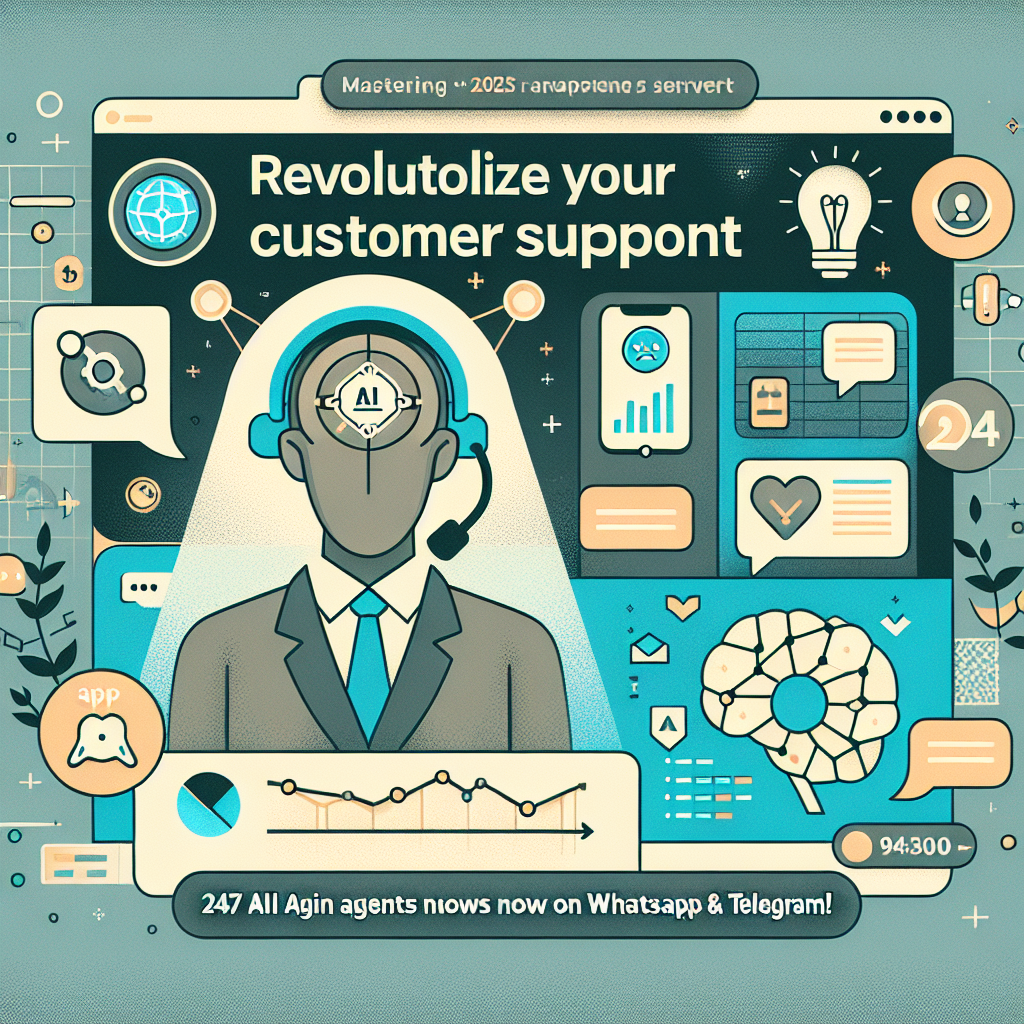“`html
Revolutionize Your Customer Support: 24/7 AI Agents Now on WhatsApp & Telegram
In today’s fast-paced digital world, exceptional customer support is no longer a luxury—it’s a necessity. Customers expect quick, personalized, and seamless interaction. Thanks to advancements in artificial intelligence (AI) technology, businesses can now meet these expectations and even exceed them. Enter AI customer support: a game-changing solution that combines 24/7 availability with unparalleled efficiency. In this article, we will explore how integrating AI-powered chatbots on platforms like WhatsApp and Telegram can revolutionize the way businesses interact with their customers, improve customer satisfaction, and streamline operational costs.
What is AI Customer Support?
Understanding AI and its Role in Customer Support
AI customer support refers to the use of artificial intelligence technologies, such as natural language processing (NLP) and machine learning (ML), to automate, improve, and personalize interactions between customers and businesses. From answering frequently asked questions (FAQs) to assisting with complex inquiries, AI customer support offers scalable solutions to handle customer needs.
Why Automate Customer Support?
Managing customer interactions across multiple touchpoints manually can be resource-intensive and error-prone. AI automation allows businesses to reduce response times, provide consistency, and manage high volumes of inquiries effortlessly. This transformation is particularly impactful on messaging platforms such as WhatsApp and Telegram, where businesses frequently engage with customers.
The Rise of WhatsApp Chatbots
Why WhatsApp is a Preferred Platform for Support
WhatsApp boasts over 2 billion monthly active users, making it one of the most popular messaging apps in the world. Businesses use WhatsApp to connect with customers because it offers convenience, familiarity, and unparalleled reach. WhatsApp chatbots powered by AI take this interaction a step further, automating repetitive tasks while delivering personalized support.
Key Benefits of Using WhatsApp Chatbots
- 24/7 availability: Your business is always accessible to customers, even after hours.
- Instant responses: AI handles customer queries within seconds, enhancing customer satisfaction.
- Cost-effective: Reduce overhead costs by minimizing the need for human agents.
- Scalable: Handle thousands of customer interactions simultaneously with ease.
Telegram: An Emerging Player for AI Support
The Growing Popularity of Telegram as a Business Tool
Telegram has steadily gained traction as a preferred messaging app for businesses, especially in regions with high privacy concerns. With its robust API, Telegram allows for seamless integration of AI-powered chatbots, enabling automated yet meaningful customer interactions.
How AI Chatbots on Telegram Add Value
- Enhanced security: Telegram provides end-to-end encryption, ensuring customer data remains safe.
- Interactive features: From polls to rich media, Telegram bots leverage the app’s unique functionalities for improved engagement.
- Global reach: Telegram’s diverse demographic makes it appealing for businesses with an international presence.
Core Features of 24/7 AI Customer Support
Natural Language Processing (NLP) for Seamless Conversations
NLP allows AI to understand and interpret text at a human level. This means chatbots can have natural, context-aware conversations, making customers feel as if they’re speaking with a human rather than a bot.
Machine Learning for Continuous Improvement
Machine learning ensures the chatbot gets smarter with each interaction. Over time, it can recognize specific customer behaviors, learn common questions, and provide faster, more accurate responses.
Multilingual Support for a Global Audience
AI chatbots can provide round-the-clock support in multiple languages, breaking down language barriers and making businesses more inclusive.
Implementing AI Chatbots on WhatsApp and Telegram
Step 1: Define Objectives and Use Cases
Before implementing AI chatbots, identify key objectives—whether it’s to answer FAQs, enable transactional functionality, or provide technical support.
Step 2: Choose the Right AI Platform
Selecting the right AI platform is crucial. Tools like Dialogflow, ChatGPT, or other business-specific solutions effectively power chatbots. Ensure that the platform supports integration with both WhatsApp and Telegram APIs.
Step 3: Train and Test the Chatbot
Use historical customer data to train the chatbot. Test it rigorously to ensure it performs well in handling various scenarios and customer inquiries.
Step 4: Monitor and Optimize
Continuous monitoring ensures your chatbot delivers optimal performance. Gather customer feedback and refine the bot’s responses periodically.
The Future of AI Customer Support
AI Trends to Watch in Customer Support
Emerging trends such as sentiment analysis, voice bots, and AR-powered chats are poised to further transform AI customer support. Businesses that leverage these innovations will gain a competitive edge.
Embracing a Hybrid Model
While AI can handle most tasks, there will always be situations requiring human intervention. A hybrid approach that assigns routine queries to AI and complex ones to human agents ensures the best customer experience.
Conclusion
The integration of AI customer support on popular messaging platforms like WhatsApp and Telegram is more than just a technological upgrade—it’s a strategic investment in customer satisfaction and business efficiency. With benefits such as 24/7 availability, instant responses, and cost savings, AI chatbots provide businesses with a competitive edge. By embracing this next-generation technology and continually refining its implementation, businesses can build lasting relationships with their customers and prepare for a future powered by AI. Don’t wait—revolutionize your customer support today!
“`

